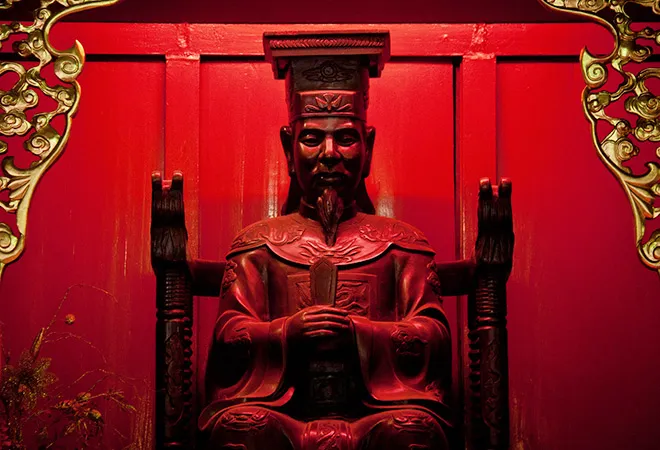-
CENTRES
Progammes & Centres
Location
Despite the persistence and spread of the corona pandemic, China has managed to use cultural centres as a tool to maintain its influence and geopolitical importance in different regions.
 This is the 95th article in the series The China Chronicles.
Read the articles here.
This is the 95th article in the series The China Chronicles.
Read the articles here.
As China is looking to expand its influence even during the COVID-19 pandemic, its relationship with “all-weather” friend, Pakistan, is very significant. Three months ago, Pakistan’s University of Sargodha expressed its solidarity and support to China in its struggle against the virus by organising a solidarity walk with the Chinese teachers. In mid-April, China’s Henan Normal University (HNU) donated 3,000 masks to Sargodha University for its fight against the pandemic. These might seem like novel exchanges, yet for all its possible benefits, they are accompanied with long-term economic and political risks for Islamabad.
In April 2005, China and Pakistan entered into an agreement to establish Confucius Institutes — propagating Chinese civilisation and offering language training programmes. The first institute was established at National University of Modern Languages Pakistan (NUML) in collaboration with Beijing Language and Culture University China and Confucius Institute Headquarter. A decade since then, these institutes have been able to make strides in proliferating Chinese culture and language across Pakistan. Not surprisingly, more than hundreds of thousands of Pakistanis are presently enrolled in these institutes for obtaining a diploma in Mandarin language.
Similarly, in 2019, China established a specially designed Chinese Language Training Programme at the University of Sargodha for the faculty members, scholars and students. Teachers from Hanban, Beijing (Confucius Institute Headquarters) were sent to Sargodha University to stay on for a year as a precursor to the setting up of the Confucius Institute in the university. Furthermore, Pakistan Institute of China Studies constituted in the University of Sargodha is in charge of supervising this programme and works towards “deepening understanding of Chinese language, culture and civilisation as well as emerging policies and role in the global economy and politics.” The Director of Pakistan Institute of Chinese Studies during the organisation of a special lecture on 4 October 2019 made a statement glorifying Chinese language, culture, and economic projects. “More than 70 countries are linked with Belt and Road Initiative (BRI) project of China that will help producing business and employment opportunities for Pakistani youth under its flagship project, China Pakistan Economic Corridor. Rapid growth rate of Chinese economy clearly suggests that China will be the world’s greatest economic power before 2030,” he said.
However, these universities do not realise that more than Beijing’s commercial agenda, the Chinese vision is driven by strategic factors. These bilingual training programmes are solely for the Chinese to benefit as it will expedite the construction of the China Pakistan Economic Corridor (CPEC), running from the Xinjiang province of China to Gwadar in Pakistan over the Khunjerab pass, as well as cement China’s cultural diplomatic hold over Pakistan.
While taking a step higher on the ladder, in early 2018, the Upper House of Pakistan (Senate), passed a resolution calling for “official Chinese language” courses to be launched for everyone working in the CPEC project with the motive of removing “communication barriers.” Not surprisingly, despite local protests against the erosion of local traditions, cultures, and businesses with the excessive Chinese presence, Pakistan’s formal and informal institutions have agreed to go ahead with Mandarin training. This is another instance, where the state of Pakistan has not stood by its people but situated its friendship with China on a different pedestal. Its inaction on the suppression of Uighur Muslims by the Chinese is also instructive and demonstrates the extent to which it is ready to overlook the Chinese state brutalities. While, on one hand, Pakistan projects itself as the global defender of Islam, on the other it stays numb about one of the most abhorrent persecution of Muslims.
Furthermore, despite COVID-19 worsening the already deteriorating Pakistan economy, Islamabad has agreed to go ahead with the USD 60 billion CPEC. Pakistan’s CPEC Authority Chairman and Special Assistant to Prime Minister on Information, Asim Saleem Bajwa, in early May voiced his approval on going ahead with the second phase of the multibillion dollar CPEC project, making clear in a statement it is “crucial for the development of the country.”
The CPEC is ultimately aimed at strengthening China’s One Belt and One Road Initiative (OBOR), launched in 2013, intended to expand Beijing’s economic and political influence from East Asia to Europe. At present, there are 480 Confucius Institutes operating in six continents around the world and around hundred million across the world are learning Mandarin. Despite the persistence and spread of the corona pandemic, China has managed to use these cultural centres as a tool to maintain its influence and geopolitical importance in different regions. Beijing, traditionally, has been clichéd to be a passive player in the world of high-end diplomacy with its principle of “non-interference,” however, under President Xi, it is prepared to fortify its diplomacy with cultural imprints and huge economic largesse.
The views expressed above belong to the author(s). ORF research and analyses now available on Telegram! Click here to access our curated content — blogs, longforms and interviews.